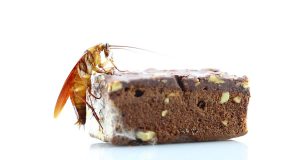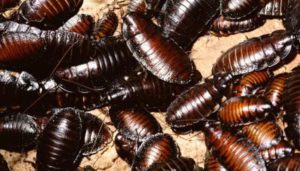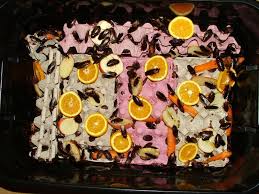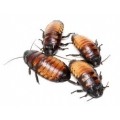 Feeder Roaches
Feeder Roaches
 Feeder Roaches
Feeder Roaches
 Feeder Roaches
Feeder Roaches
 Feeder Roaches
Feeder Roaches
Madagascar Hisser Care. This Meaty Roach is Sometimes called the Madagascar Hissing Cockroach. Scientific name: gromphadorhina portentosa
Madagascar Hissing Cockroach Lifespan: Up to 5 Years.
Are Madagascar Hissing Cockroaches Clean? Madagascar Roaches are remarkably clean and easily digestible meaty Feeder Roach, high in meat to shell ratio for a high protein and nutritious meal. Madagascar Hisser Care is Easy. They are ideal for feeding to Bearded Dragons and other lizards.
Offers a wide and varied sizes of roaches to use as feeders for your reptiles & amphibians. Hissers are the best roach to feed Bearded Dragons. Madagascar Hisser Care Is Easy as they are easily maintained, they cannot fly & climb smooth surfaces and can benefit from using a super slick roach barrier that cannot be penetrated. Hissers eat almost anything. Hissers are silent. They are smell free compared to other insects like crickets.

BUY MADAGASCAR ROACH & COLONIES NOW
Madagascar Hisser Care. Roach Colonies Can Be Housed in a ventilated plastic tub, (we recommend 14-20 gallon totes) or aquarium tank with a large surface area. Surface area is increased with the addition of Egg Flats For Roaches to hide in and nestle.
Madagascar Hissers can climb on smooth surfaces, so you should Buy CONTAIN ROACH BARRIER a premium Roach Barrier that absolutely will CONTAIN Feeder Roaches. With the barrier applied there is little chance of escape and it remains indefinitely & does not melt or fade away.
Our Premium Madagascar Hisser Roach Colony Kits With CONTAIN Roach Barrier are the perfect Buy.
For Madagascar Roach Cae a standard plastic storage tub ( 14-20 gallon Sterilite or Rubbermaid ) type bin works well. Punch holes in the lid for ventilation or better yet cut out and install screen mesh in the top and or sides of the tub for optimal ventilation.
As Far as Madagascar Hisser Care Hisser Roaches Prefer Living in Dark Conditions
So using a dark tub or storing it in a dark place is preferable. Hissers require places to hide, so cardboard tubes or eggflats provide additional real estate and places to raise babies making them feel secure. Hissers like nestling and living in close quarters. No substrate is needed as this makes removal, separation and maintenance easier.

Madagascar Hisser Care
Hisser Feeder Roaches will eat Just about anything. After all, they are roaches. This makes for easy feeding. Make sure that they have access to Preferably Organic High Protein Grains at all times like oats, wheat, wheat bran. They also need some protein, some feed roaches dog or cat food, or fish food for protein.
Alternatively a lot of people will use a Balanced Protein All Natural Organic Roach Food or Chow that is formulated to have the correct protein percentage as dog or cat food can be too high in protein and lead to uric acid accumulation and death in your reptiles & amphibians.
Roaches should periodically 2-3x a week be fed produce that has been cleaned thoroughly of pesticides or that is organic.
Will be passed along to your reptiles & amphibians so it is best to keep the hissers gut-loaded with optimum nutrition to be passed along as you feed the hissers off.
Feed fresh fruits like apples, and bananas. These are best as they are sweet and nutritious. Hissers are readily consuming produce. Feed the amount that the hissers will consume within 24 hours. Remove the remains to eliminate the growth of mold.
Mold can wipe out your entire hisser colony. Fresh produce like carrots, leafy greens and other root vegetables provide a well rounded diet for not only the roaches but the pets that you feed them to.
Safely Water The Hisser Feeder Roaches. Insect Safe Water Gel Crystals Work Best. They are a crystal that swells up when you add it to water and provides a high surface area gel for the Hissers to extract water without fouling it or drowning.
Water gel Crystals are much better than other methods such as cotton or sponges as they last longer. A single Tablespoon of crystals will make more than a gallon of water gel crystals to water your roaches or feeder insect colony.
The Hisser Roach is a tropical species and do best at higher humidity levels 40-50% is sufficient. Keep humidity levels maintained at these levels. If not, you may experience a die off. Nymphs are molting well with good humidity. Females are giving birth better too with proper humidity.
Place a temperature gauge with humidity level indicator in the bin you house your roaches in. Increase humidity levels. Offer fruits and vegetables. Also, Include a screened or covered water container. Lastly, lower the heat or simply place more Water Crystal Gel (Prevents Drowing)
Hissing Cockroaches Live In Tropical Conditions as they are a from Madagascar. Keep Hissing Cockroaches in temperatures around (82- 88°F ). They can survive at lower temperatures, but will not breed as quickly. Higher temps 88-95°F will greatly increase breeding cycles and produce more Hissing Cockroaches as Feeders as well as increase the life cycle of your colony. Make sure humidity levels are at least 40%

A Madagascar Hisser Roach Become Sexually Mature Around 6 months of age, so a successful hisser breeding & feeding colony will not take very long to establish. Once sexually mature, females will give birth to up to 35 baby hisser nymphs. This happens every 30-45 days. If you have to feed off use males as feeders and keep the female to male ratio at about 3-5 females per 1 male.
Adult Hisser Roaches Are Easy to Sex as the females are longer than the males and the males have larger distinct horns. Sexing nymphs is more difficult as there are variations during their lifestyle and must mature only being identifiable at their last molt.
How to keep Madagascar Hissing Cockroaches from breeding? Just lower the temps below 75 degrees and consider feeding off more adults. Both measures can be utilized as needed to slow down reproduction.
Additional Tips For Successful Breeding of Hissing Cockroaches Roach Colony
A Cleaner Crew for Madagascar Hisser Roaches are special species of small larvae and beetles. They consume excess grains and process the roach waste or frass. They do not bother the roaches and they act as a great Clean-Up Crew for your roach bins and enclosures
Feed Your Colony Oranges. Hisser Roaches Are Breeding Faster and giving birth to babies quicker. The breeding rate of Feeder Roaches is increasing now. Feed them oranges once a week or so. Hissing Roaches Do Best In High Heat Temperatures.
In case of escape no worry is needed as they will not infest your home or neighborhood. They will most likely die if not found right away. Escapees are not a threat. They will be found motionless. Check to see if they revive by adding them back to heated environment and allow them to rehydrate. Prevent Escape of Roaches With CONTAIN Roach Barrier.
STOP DUBIA ESCAPES BUY CONTAIN ROACH BARRIER
Make Extra Money With a Dermestid Beetle Taxidermy Business
 Feeder Roaches
Feeder Roaches
Name: Dubia Roach, sometimes called the Orange Spotted Roach Argentine Roach, or the Guyana Spotted Roach.
Scientific name: Blaptica dubia
Lifespan: 10-12 months for males, females live longer, usually reaching 20-22 months.
Dubia roach care. Dubias are an easily digestible Feeder Roaches for pets such as Bearded Dragons. They are high in meat to shell ratio for a high protein and nutritious meal.
The various life cycles of the dubia offer a wide and varied sizes of roaches to use as feeders for your reptiles & amphibians. As far as care you can easily maintain your roaches with ease. They cannot climb smooth surfaces or fly. They eat almost anything and are silent and smell free compared to other insects like crickets.
House these Feeder Roaches in a ventilated plastic tub. We recommend 14-20 gallon totes. Alternately, use an aquarium tank with a large surface area. Surface area is increased with the addition of Egg Flats For the roaches to hide in and nestle. Dubia Roaches do not climb well on smooth surfaces, so as long as the sides of the enclosure are smooth there is little chance of escape.
A standard plastic storage tub (Sterilite or Rubbermaid ) type bin works well. Punch holes in the lid for ventilation or better yet cut out and install screen mesh in the top and or sides of the tub for optimal ventilation. No substrate is needed as this makes removal. Use no substrate. This makes separation and maintenance easier. Or Use Our Bioactive Substrates for no fuss cleaning.
Most Feeder Roaches Prefer Living in Dark Conditions so using a dark tub or storing it in a dark place is preferable. The roaches require places to hide, so cardboard tubes or eggflats provide additional real estate and places to raise babies making them feel secure. Dubia roaches like nestling and living in close quarters.
Roaches will eat just about anything, after all they are roaches. This makes for easy feeding. Make sure that they have access to High Protein Grains at all times like oats, wheat, wheat bran. They also need some protein, some feed roaches dog or cat food, or fish food for protein.
Alternatively a lot of people will use a Balanced Protein All Natural Chow or food that is formulated to have the correct protein percentage as dog or cat food can be too high in protein and lead to uric acid accumulation and death in your reptiles & amphibians.
Dubia Roach Care Should include periodical feedings of fresh produce 2-3x a week. Dubia can be fed produce that has been cleaned thoroughly of pesticides or that is organic. Any food that you give your roaches will be passed along to your reptiles & amphibians so it is best to keep the Roaches Gut-Loaded with optimum nutrition to be passed along as you feed the roaches off.
For Dubia Roach Care Fresh fruits like apples, bananas are best
As they are sweet and nutritious and are readily consumed. Feed food that the roaches will consume within 24 hours. Remove the remains. This will eliminate the growth of mold. Mold can wipe out your entire colony. Feed Fresh produce like carrots, leafy greens and other root vegetables. They provide a well rounded diet for not only for dubia roach care, but also the pets that you feed them to.
To Safely Water The roaches Water Gel Crystals Work best. Water Gel Crystals are a crystal that swells up when you add it to water and provides a high surface area gel for the roaches in the colony to extract water without fouling it or drowning. Water gel Crystals are much better than other methods such as cotton or sponges as they last longer. A single Tablespoon of crystals will make more than a gallon of water gel crystals. Add them to water your roaches or feeder insect colony.
Dubia Roach Care Dubia Roach Humidity & Temperature For Your Dubia Roach Colony
Please Note:
Dubia are a tropical species and do best at higher humidity levels 40-50% is sufficient. Maintain humidity levels. If not, you may experience a die off as nymphs molt skins or as they are giving birth. Place a temperature gauge with humidity level indicator in the bin you house your roaches in. Increase Humidity levels. Offer fruits and vegetables. Include a screened or covered water container. Lower the heat. Lastly place more Water Crystal Gel (Prevents Drowning)
These Roaches Live In Tropical Conditions as they are a South American Roach. Keep Dubia in temperatures around (82- 88°F ). They can survive at lower temperatures, but will not breed as quickly. Higher temps 88-95°F will greatly increase breeding cycles and produce more roaches for you to use as Feeders as well as increase the life cycle of your colony. Make sure humidity levels are at least 40%

A Dubia Roach will become sexually mature around 6 months of age, so a successful breeding & feeding colony will not take very long to establish. Once sexually mature, females will give birth to up to 35 baby nymphs every 30-45 days. If you have to feed off use males as feeders and keep the female to male ratio at about 3-5 females per 1 male.
Adult Dubias are easy to sex as the females are larger than the males and only have short clipped wings, The males have large wings that they do not use to fly. Sexing nymphs is more difficult as there are variations during their lifestyle and must mature only being identifiable at their last molt.
Most Roaches Breed Faster and give birth to babies quicker when fed oranges. Increase the breeding rate of your roaches this way. A great secret is to feed them oranges once a week or so. Tropical Roaches Do Best In High Heat Temperatures. In case of escape no worry is needed as they will not infest your home or neighborhood. Escapees will most likely die if not found right away. Escapees are usually found motionless. Check to see if they revive by adding them back to heated environment and allow them to rehydrate. How To keep dubia roaches from escaping? Stop Escape of Roaches With CONTAIN our Super Slick Roach Barrier.
Many Customers Wonder How Roach Cleaner Crews Really Work For dubia roach care. A Cleaner Crew for Dubia Roaches are special species of small larvae and Flesh Eating Beetles. Cleaner Crews consume excess grains and process the roach waste or frass. They do not bother the roaches. They are a great Clean-Up Crew for your roach bins and enclosures
Start A Dermestid Taxidermy Beetle Business